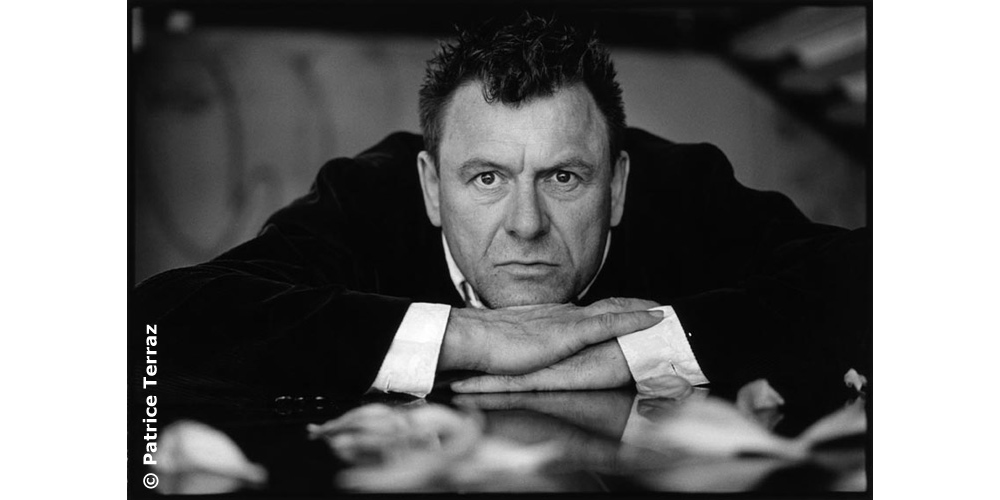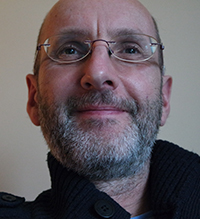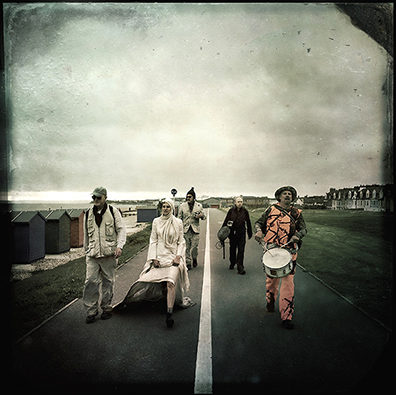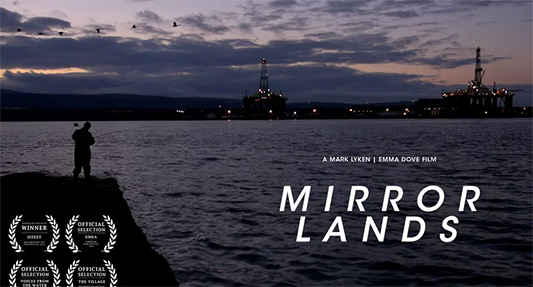First symposium on the sound and music in documentary film
 Andrew Kötting - photo courtesy of Patrice Terraz
Andrew Kötting - photo courtesy of Patrice Terraz
Thu, 16 Feb 2017 10:54:00 GMT
The symposium welcomes the innovative and controversial film maker Andrew Kötting as its keynote speaker
 A GROUNDBREAKING conference at the University of Huddersfield features a lecture and a performance by one of Europe’s most innovative and controversial film makers.
A GROUNDBREAKING conference at the University of Huddersfield features a lecture and a performance by one of Europe’s most innovative and controversial film makers.
The two-day event (Feb 23-24) is titled Sound and Music in Documentary Film. Organised by Senior Lecturer Dr Geoffrey Cox (pictured left) – himself a composer for film whose latest work will be premiered at the event – it is thought to be the first symposium to focus on its topic. It has attracted contributors from several European countries, plus China, the USA and Latin America.
The keynote talk is to be given by Andrew Kötting, creator of a sequence of experimental documentaries and feature films that have earned him a reputation as a maverick, but also the admiration of leading critics. He is a professor at the University for the Creative Arts.
 At the University of Huddersfield conference, Andrew Kötting’s lecture will be followed by a performance based on his 2016 film EDITH WALKS (pictured right), which reimagines a 104-mile journey made by the lover of King Harold, after he was slain at the Battle of Hastings. A segment of the film will be accompanied by a live performance from Claudia Barton and Andrew Kötting.
At the University of Huddersfield conference, Andrew Kötting’s lecture will be followed by a performance based on his 2016 film EDITH WALKS (pictured right), which reimagines a 104-mile journey made by the lover of King Harold, after he was slain at the Battle of Hastings. A segment of the film will be accompanied by a live performance from Claudia Barton and Andrew Kötting.
Sound and Music in Documentary Film aims to bring together researchers and practitioners to discuss the use of sound and music within all aspects of documentary, probably for the first time, said Dr Cox.
His own new film Mill Study – made with Keith Marley – will be screened during a documentary film night (Thursday, 23 Feb, 7.30pm) that is part of the University of Huddersfield’s annual Electric Spring –“five days of sonic exploration”, running from 22-26 February.
Mill Study evokes the atmosphere of a working textile mill in Slaithwaite. The same film night also features Mark Lyken’s and Emma Dove’sdreamlike Mirror Lands, an award-winning portrait of the Black Isle in Scotland.
Dr Cox will also present a paper at the conference that includes an analysis of the legacy of documentary pioneer John Grierson, who was the subject of 1969 tribute film presented by Alfred Hitchcock.
“Grierson himself coined the term ‘documentary’ in the 1920s,” said Dr Cox. “There is a strong argument that the documentary as we know it came from Britain. In the early days they were doing more experimental things than became the norm after World War Two, when journalistic modes became dominant.
 ◄ Mark Lyken’s and Emma Dove’s film ‘Mirror Lands’
◄ Mark Lyken’s and Emma Dove’s film ‘Mirror Lands’
“Nowadays, it’s very varied and much more open. You still have issue-based, journalistic documentaries. But you also have those that cross over into art film.”
Sound and Music in Documentary Film breaks new ground, because though the importance of sound and music in fiction film is recognised in creative practice and increasingly in academic study, its creative use in documentary has been downplayed generally and even seen as problematic.
“Once you start adding music that’s evocative, or you start manipulating sound, then there are questions about reality, misrepresentation and personal views coming in. So there has always been a slight suspicion of manipulation,” said Dr Cox.
However, attitudes have been changing, and the University of Huddersfield conference will feature a wide range of papers and presentations from researchers at nine UK universities plus institutions in Sweden, Brazil, the USA, Finland, Chile, Canada, France and China.
Sessions cover topics that include the voice in documentary, the role of sound in industrial and nature films, a range of international perspectives, plus sonic representations of World War Two. Among the contributors is University of Huddersfield PhD student Simon Connor, who probes the multi-faceted role of the sound design engineer in documentary film.







